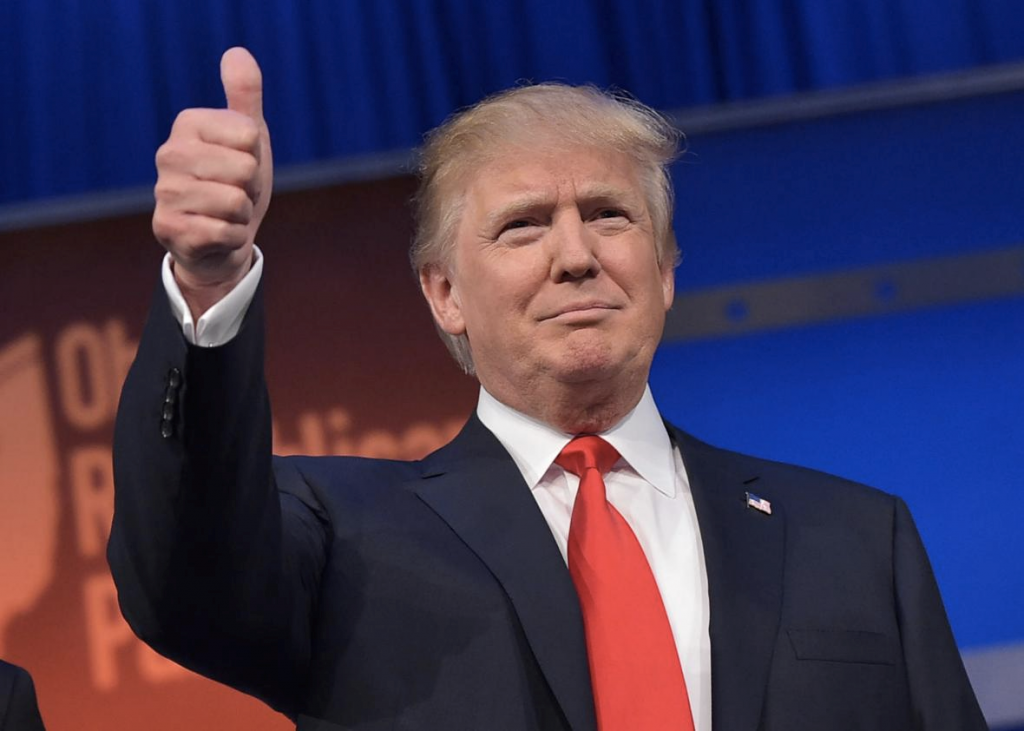It seems like almost everyone knows billionaire business mogul Donald Trump. Trump has stirred conversation here and abroad, much of it negative.
Many of the foreign students we spoke to found Trump’s politics shocking yet strangely familiar. He is employing tactics that have been used in many countries throughout history.
The potential endgame of a Trump presidency, however, seemed to concern them all.
Brazil: “This Type of Leader Spreads.”
Ana Ribeiro, Sasha Botello and Allan Franco, a group of Brazilian students, said they spent a whole night discussing the possible consequences of a Trump presidency. The American economy could collapse, they said, if Trump’s hostilities against immigrants reached a fever pitch.
“The country attracts the greatest minds,” said Allan Franco, a chemical engineering major. “It would be really bad.”
Donald Trump, known for misogynist comments, praising America’s strength, and saying he’s fighting for the country, reminded the group of Jair Bolsonaro, a conservative Brazilian congressman running for president in 2018.
“He claims he’s not corrupt and everything and just doing good things for the country, but I mean when you have someone in power who is homophobic, racist, all those things, that’s not good for the country,” Franco said.
Bolsanaro is famous for controversial remarks, like telling politician Maria do Rosário she was not worthy of being raped and calling “bandits” the “cancer of the country.” He also strongly supports a military state. However, the group said Trump could be worse.
“I would say (Trump) is more dangerous. There’s more power behind him,” said Sasha Botello. “The United States has more power than Brazil.”
And while elections in the United States may be far, they see a Trump election starting a wave of extreme politicians coming to power.
“This type of leader spreads,” said Ribeiro.
“If he wins here, people like Bolsanaro will grow stronger,” Franco added.
Venezuela: “He’s a Businessman.”
Cecelia Celis, a sophomore photography major at the Fashion Institute of Technology, sees a concerning parallel between how populists Hugo Chávez and Donald Trump rose to power.
Celis said that in Venezuela, the government appealed to the poor. Meanwhile, in the United States, Donald Trump is targeting the middle class, working class laborers, and the many people who have seen their manufacturing jobs disappear since the 1990s. indeed, Donald Trump is promising them incredible change. But both sides have also taken to blaming others for their problems.
“He’s saying that immigrants are ruining the United States,” Celis said. “What the government from Venezuela did and what the government from Cuba also did is blame people from the outside for hurting them. It’s just the same thing. It’s the same idea, the same propaganda… It’s just taking it out on a minority.”
Celis said her own country improved thanks to people with different minds who brought new technology and perspectives to the country. So what if the United States indeed elected Donald Trump as President?
“Good luck,” Celis said. “He’s not a politician. He’s a businessman. And businessmen think about their own-wellbeing.”
Scotland: “He Thinks Scotland Should Love Him.”
Donald Trump might be a little Scottish, but warm feelings for him there are few and far between.
“He’s so unstable I wouldn’t put it past him trying to nuke us because we don’t want him,” said Sheona Hamilton, 23, a Glasgow Caledonian University graduate. “What’s worse is he thinks Scotland should love him because his mother is from here, yet he was calling out other candidates for having parents from other countries.”
Liam Bingham, 24, an England resident, took this sentiment to another level.
“I genuinely believe Trump will be the cause World War 3 if he gets into power,” he said. “Trump is incredibly nuke-happy because he simply is not intelligent enough to comprehend the sheer destructive force a nuke possesses. If a modern nuke detonates anywhere on the planet, the entire world will feel the effect of it, including his pretty little mansion.”
Hamilton says there are few she can think of there that parallel Donald Trump’s behavior. She noted that the UK Independence Party, or UKIP, a Eurosceptic right-wing populist political party, seemed somewhat close.
“But I can’t think of someone who’d be close to Donald Trump… Except Katie Hopkins,” Hamilton said, referring to a British television personality and newspaper columnist who has suggested the creation of “euthanasia vans” to reduce the elderly population and using gunships to stop the flow of migrants into Europe.
“She’s horrible about people in the worst way. She isn’t respected. The majority hate her,” Hamilton said.
Considering the parallels, Sheona said she is happy to have signed the United Kingdom’s petition to keep Donald Trump away from the country.
“I have friends in America that fit into all the categories he hates– hell, I even do,” she explained. “I’m a woman, not sure I’m 100 percent straight, I’m not rich, I’m not willing to, as he put it, stay on my knees and look pretty.”
India: “Canada Respects Immigrants.”
Relations between India, the world’s largest democracy, and the United States, the world’s longest democracy, date back to 1946 — a year before the former even scored independence from the British Empire.
The ties have warmed even further in recent years, with the two nations signing cooperative agreements on climate change and security. President Obama’s second visit there in 2015, when he was a chief guest in India’s Independence Day ceremonies, marked a high point.
But Rahul Bhaya, 22, senior computer science major from Ajmer, India, sees a Donald Trump presidency as something that could send this relationship crashing down. He said that when Donald Trump began blaming India for stealing American jobs, it flooded Indian media.
“His claims are not true. India has always been supportive of the U.S., so his hate is not justified,” Bhaya said. “And I feel blaming the entire country is not good. He’s being racist in a way.”
For him, a Donald Trump presidency is not simply an “if.” Between his brother’s tarot-like card predictions and Professor Helmut Norpoth’s model forecasting a Trump victory, his entire family is worried.
“My parents think if he becomes the president, their dream of their child working in the U.S. would be over,” Bhaya said. “I have a job offer in California in hand, but they think I would just not be allowed to stay in the country if he becomes the president.”
His brother, a Stanford graduate who has resided in the United States for five years, applied for Canadian citizenship and will be moving to Toronto in October. His work visa needed reapplication every three years, Bhaya said, and the wait for citizenship in the United States was about ten years.
Now Bhaya is also considering moving north too. The message he’s receiving is that the United States does not care very much for immigrants.
“Canada respects immigrants,” he said. “The U.S. doesn’t.”
Pakistan: “Rational, Sensible Voices.”
Arooba Farooq, 21, a journalism and political science double major, has almost never seen something quite like Donald Trump.
“I know there are pretty crazy people, even in Pakistan. Many politicians are beyond crazy,” she said. “But they are quite politically correct. They wouldn’t just say anything that comes to their mind.”
The worst politician in Pakistan she saw was Altaf Hussein, who defied political conventions. She said he gathered huge mobs, encouraged violence, and even got drunk before singing during speeches. But at least now, Farooq said, they have reached a tipping point, where people inside his party started revealing details about connections to intelligence agencies, and lavish spending.
Here in the United States, Farooq is feeling pressure. Terrorism dominates the headlines and Republican presidential candidates focus heavily on it. She cited Trump’s response to the Brussels terrorist attack (he said if such an attack happened here he would close the borders and utilize torture), his call to ban all Muslims from the country, and his praise of possibly killing Muslims with bullets dipped in pig’s blood. She also noted that Muslims are suffering the most from these terrorist attacks, bearing the brunt of casualties and media scrutiny.
While his comments do not help the tension, his other speech and what he’s inspired in others are concerning to her.
“He’s not just a threat to Muslim communities, but he’s also a threat to other minority groups,” she said.
But Farooq doubts he will step foot in the Oval Office.
“We’re more likely in America to die by a bolt of lightning than by a Muslim terrorist, so I think we need leaders at this time that unite people rather than dividing them,” she said, “and I know that the rational, sensible voices of America will prevail.”
— — —
Donald Trump, with nearly 1000 delegates following him as of April 29, is marching confidently towards the Republican National Convention in mid-July. John Kasich and Ted Cruz, his Republican rivals, stand virtually no chance. Trump is less than 300 delegates shy of becoming the Republican presidential nominee.
While many of these students indeed know the populist Republican frontrunner, most seem to hope they will never know him as President Donald J. Trump.




Comments are closed.